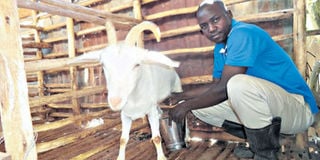Dairy goats are as rewarding as cows

Ibrahim Juma milks one of his goats in his home in Migosi, Kisumu. PHOTO | EVERLINE OKEWO | NATION MEDIA GROUP
What you need to know:
- Production of milk, according to the farmer, depends on feeds, vaccination and quality mating.
- Juma started the venture with 30 indigenous goats but he realised they were uneconomical.
- The instructor at the International Youth Fellowship Taekwondo Academy in Kisumu says goats are good for the urban farmer who has a small piece of land.
Ibrahim Juma dips his right hand in a bucket he is carrying, scoops some dairy meal and puts it in a feeding trough in the goat pen.
The farmer repeats the task five times and soon he gets the attention of four dairy goats he wants to milk in his quarter acre Kisumu farm.
The big-horned animals had made frantic attempts to try and escape from their wooden pen when they saw him carrying an aluminium bucket for milking.
“Goats are not like cows. They can be stubborn, particularly when they know you want to milk them. They recognise this bucket,” says the farmer.
Juma keeps 17 dairy goats at his home in Migosi, Kisumu, four of which are lactating.
The goats are of the Saanen, Toggenburg and Alpine breeds.
“I get 19 litres of milk a day from the four goats. Each produces between three and six litres of milk in a day that I sell for Sh150 a litre.”
Production of milk, according to the farmer, depends on feeds, vaccination and quality mating.
“I went for dairy goats because I wanted to be different and I knew they do not demand a lot of space. I realised they were the perfect animals to keep on my quarter acre in an urban area under the zero-grazing system.”
He feeds them dairy meal, napier grass and shrubs that he gets from the neighbourhood.
“Dairy meal helps them produce a lot of milk. Most goats give less than a litre per day because farmers give them poor feeds.”
STARTING VENTURE
Juma started the venture with 30 indigenous goats but he realised they were uneconomical.
“I used to keep them free-range. I would release them in the morning and wait for them to return in the evening. The system helped me cut cost but the goats kept on disappearing.”
A visit to the Kisumu Agricultural Show in 2003 opened his eyes on dairy goat farming. Juma got contacts of a dairy goat farmer, who encourage him to embrace the practice. However, he hit a snag.
“He wanted to sell to me a mature Saanen goat at Sh25,000 but that was too expensive.” Juma settled for the alternative, which was to crossbreed the quality breeds with his indigenous ones.
This paid off. The following year the number of his goats doubled to 10 crossbreeds. He sold five of them at Sh25,000 and bought pure Saanen breeds, which produce more milk.
The farmer makes over Sh2,800 in a day. “There is good demand for goat milk from residents because they know its nutritional value. The returns are good, I believe much better than if I was keeping cows which most people in this region rear,” says the farmer, who is eyeing commercial goat farming.
The instructor at the International Youth Fellowship Taekwondo Academy in Kisumu says goats are good for the urban farmer who has a small piece of land.
Dr Joyce Meme, Head of Human Nutrition and Dietetics at the School of Medicine and Health, Kenya Methodist University says goat milk is rich in iron which is essential for boosting the immune system and proper functioning of the liver.





